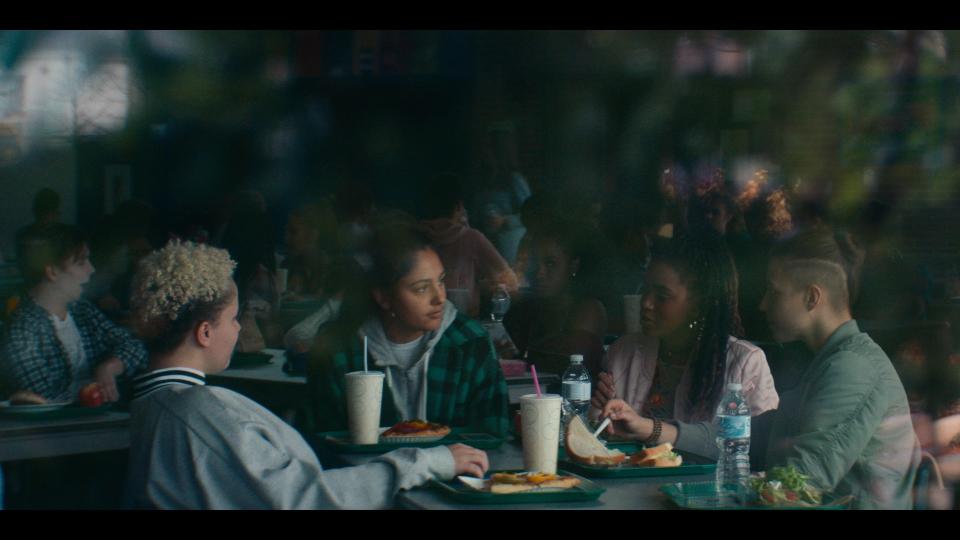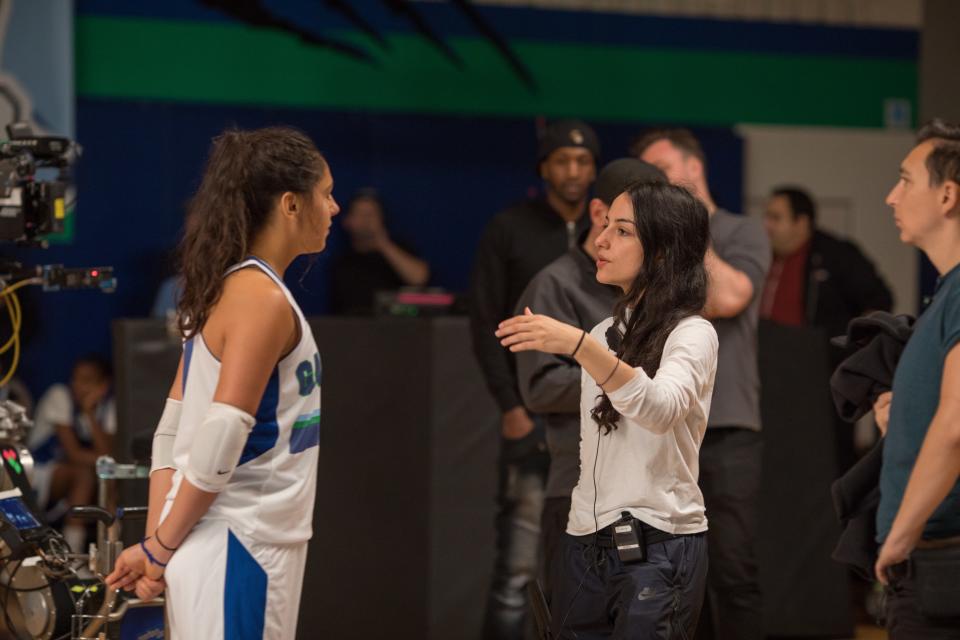HBO’s Share Addresses Sexual Assault Unlike Any Movie You’ve Ever Seen
The opening scenes of Share, HBO's digital-age drama that airs July 27, are bewildering. Mandy is a suburban teen who plays high school basketball. After a night out partying with friends, she wakes up on her front lawn, sore and confused, with an angry wound blooming on her back. Later that morning, while lying in bed, Mandy receives a text message: a video of herself passed out on a bathroom floor, a group of boys leering above. She doesn’t remember that moment, or anything that came after. Revelations about what happened explode over the 127 minutes, like a bomb in slow motion, as Mandy searches for the truth.
If the broad strokes of Share sound familiar that’s because, unfortunately, they are. From Steubenville and Columbus, Ohio to South Africa and Spain, news stories about sexual assault captured on camera are by no means normal—but, in the era of social media and compulsive documentation, they're a persistent feature of culture now.
Yet Share resists predictability in the way it presents and depicts the act and aftermath of sexual assault. The film does not condemn the morality of technology or contemporary teenage behavior. Nor does it focus on revenge, righting wrongs, or punishing a perpetrator. Instead, it sets aside abstract, righteous notions of justice to follow the minutiae of Mandy’s life after the incident.

What emerges is a gritty, piercing portrait of a young woman trying to make the best choice for herself in a society that insists there is a “right” way to respond to this kind of experience. In doing so, the film subtly weaves a narrative that acknowledges the true actualities of survivorship.
Share is director Pippa Bianco’s first feature length film; she also wrote the screenplay, based on her earlier short of the same name, which won the Cinefondation Prize at Cannes in 2015. Bianco recalls early feedback that the story of a young woman who wasn't certain she had been assaulted “strained credibility.”
But in the wake of the #MeToo movement, of Christine Blasey Ford, of the Larry Nassar trial, sexual violence is increasingly more difficult to brush aside or ignore. “At the time, I think, people still had permission to not think about it in a way that I don’t think they do now,” Bianco tells Glamour. “The more you’re aware of how much it does happen, the more impetus there is to do something.” And to pay attention.
“The minute you tell people that the film tells a story about a teenage girl, people either want to reduce it to ‘puff’ or ‘issues.’”
On a spectrum of cinematography, Share is more art house than Law & Order: SVU, an aesthetic that reflects both Bianco’s personal tastes as well as her desire to treat Mandy’s experience with as much seriousness and dignity as would be afforded to stories about people who are not teenage girls.
“There is just as much humanity, nuance, intelligence, and complication in the experience of a teenage girl as there is in anyone else,” Bianco says. Stories about rape, and particularly stories about young women who experience sexual violence, are often pegged as trauma films. She bristles at that label.
“I’m always hesitant to talk about the gender and politics side of the film, even though those things are really important to me," she says. "The minute you tell people that the film tells a story about a teenage girl, people either want to reduce it to ‘puff’ or ‘issues.’” In other words, something people feel burdened to see and talk about because of its topical urgency, without registering its artistic merits.

It’s true that Share requires a certain willingness to sit with troubling, uncomfortable subject matter. At the same time, the characters and the trajectory challenge expectations of the genre, in part by focusing on minutiae: Mandy’s interactions with her parents, coach, and teammates, her attempts to be “normal” and engage with her social life and shoot hoops, the bruise slowly healing on her back.
Rhianne Baretto, the 22-year-old Brit who plays Mandy, describes it as a process of the teenager figuring out what she wants to do, what justice looks like for her, and finding the strength to pursue that choice. Through her character’s eyes, the audience is invited to consider that maybe the “right” way forward fails to give her closure. Just as resonantly, Baretto feels that the film deconstructs fraught topics like consent and culpability, while also recognizing that, even in instances of clear right and wrong, there is no black and white. “No one is completely a villain. Everyone is making decisions day to day,” she says.
For Bianco, teasing out those distinctions and revealing the commotion roiling beneath what, on the surface, looks like passivity was the point. Early on in the filmmaking process, she remembers getting the note that her lead character wasn’t “activated” enough: Films are about people making choices—that’s what pushes a plot forward.
“But, to me, there are a lot of choices that we choose to ignore,” Bianco explains. “The choice not to say something. The choice to wait. The choice to ask for privacy. There are millions of choices, all of which are active. Just to get out of bed every day—I think that’s a heroic choice.”
Elizabeth Kiefer is a New York City–based writer and editor.
Originally Appeared on Glamour

